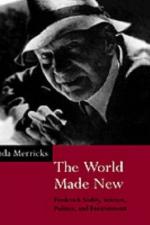|
This section contains 796 words (approx. 3 pages at 300 words per page) |

|
1877-1956
British Chemist and Political Economist
One of the early pioneers of radiochemistry, Frederick Soddy won the 1921 Nobel Prize for Chemistry for his theory of chemical isotopes. An iconoclastic individualist, he subsequently turned away from scientific research to utopian theories of scientific economics, foreshadowing current interest in the "social responsibility of science" and the "Green" movement in eco-politics.
Soddy came from a middle-class family, and was primarily raised by an older sister after the early death of his mother. An interest in chemistry surfaced only when he completed his secondary education. He entered Oxford University in 1895 and received his degree with first-class honors in 1898, with William Ramsay (1852-1916) as his external examiner. After two years of independent research at Oxford, Soddy impulsively applied for a lectureship in Toronto, and without waiting for a reply left for Canada. Upon arriving, he discovered that there was no hope...
|
This section contains 796 words (approx. 3 pages at 300 words per page) |

|


